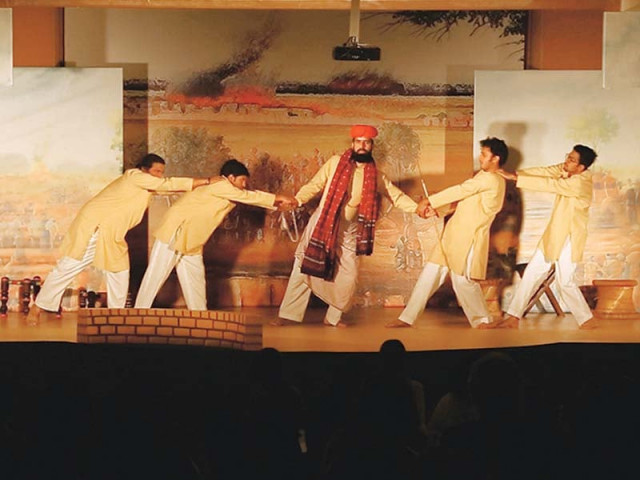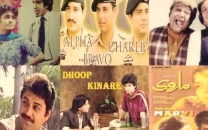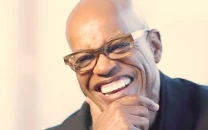Theater Wallay plan to take play based on Partition stories to India
Theatre Wallay plan on taking play ‘This Stained Dawn’ about real-life Partition accounts across the border

The play received an overwhelming response in the United States. PHOTO: PUBLICITY
The year 1947 saw the Indian subcontinent make history. But behind the known face of Partition lie untold stories of those who experienced both the joys and sorrows associated with the landmark movement. Islamabad-based amateur theatre group Theatre Wallay took it upon themselves to enact these real-life accounts based on interviews with a 100 Partition survivors. After performing their play This Stained Dawn (in English) and Dagh Dagh Ujala (in Urdu) in Islamabad and Lahore, and the United States last year, they now plan on taking it across the border.
Written and performed by a group of 11 university students, professionals and the founder of Theatre Wallay herself, Fizza Hasan, the play received an ‘overwhelming’ response both at home and overseas. After its Urdu version was performed in Pakistan between April and May, 2015, This Stained Dawn was shown in Ithaca College, New York, the Boston Conservatory of Music, George Mason University in Fairfax, Virginia, and in Washington DC last October.
As the troupe hope to take the play to India, Hasan shares how they also plan on performing in Karachi, where they initially faced resistance. “We called someone in Karachi to host the play but they refused. We assumed it was probably because this concept lacked commercial appeal,” said Fizza. “A few people even questioned the agenda of the play. This play has no agenda but to tell stories that never got told,” she added.
In remembrance: Admirers, peers pay tribute to Aslam Azhar
It took time and creative synergy between a host of people to bring the concept of the play to fruition. “The idea of the project was presented by Kathleen Mulligan, an acting teacher at Ithaca College in New York, who was visiting Pakistan on a Fulbright programme. She showed interest in the subject when one of her Pakistani students did a monologue on his grandfather’s Partition experience,” explained Fizza. “The idea resonated with us and we mutually decided to create the play, which was supported by the US Embassy.”
The process began with Fizza and her team collecting Partition stories and conducting workshops in different universities and colleges in Islamabad. “The students from the workshops were taught all about theatre acting and were given the task of collecting interviews of Partition survivors. Out of the 100 stories collected, 25 were shortlisted that were turned into a script, mostly comprising monologues,” she stated. “The interviewees were asked about their lives before, during and after Partition.”
Siachen comes to Multan Arts Council
Other than monologues, the play features visual sequences, such as the act of migration, played out to music. “The enactments were made of powerful stories, mostly heart-wrenching ones, but people also had good memories of those times. For instance, there was a story of a Muslim woman falling in love with a Sikh man, among other love stories,” shared Fizza. “One of our actors, Rabia Pasha, enacted the story of her grandmother and I performed the story of my relative, so it hit close to home. It was easy for us to get into character but it was challenging to get out of it,” she added.
Going back to how the play fared with local audiences, Fizza shared, “It was taken well and people were moved. They cried during and after the performance.” She went on to say, “Many among the Pakistani audiences had family members who had experienced Partition, so it was relatable. For them, it was a form of closure.”
Theatre: Hundreds enjoy Skit Tamasha at LUMS
As for audiences in the US, she said their reaction wasn’t so different from those in Pakistan. “In the US, the play was attended by a few Indian and Pakistani people. Americans who came had no idea about the 1947 Partition but due to the universality of the topic, they could relate to it and found the idea overwhelming.”
More on Theatre Wallay’s upcoming plans? The troupe intends on showing a documentary of performances held during their US tour some time by March. They are also in the process of creating a play on the issue of violent sectarianism. The group also holds comedy plays, skits, literary readings and theatre workshops.
Published in The Express Tribune, January 6th, 2016.
Like Life & Style on Facebook, follow @ETLifeandStyle on Twitter for the latest in fashion, gossip and entertainment.



















COMMENTS
Comments are moderated and generally will be posted if they are on-topic and not abusive.
For more information, please see our Comments FAQ